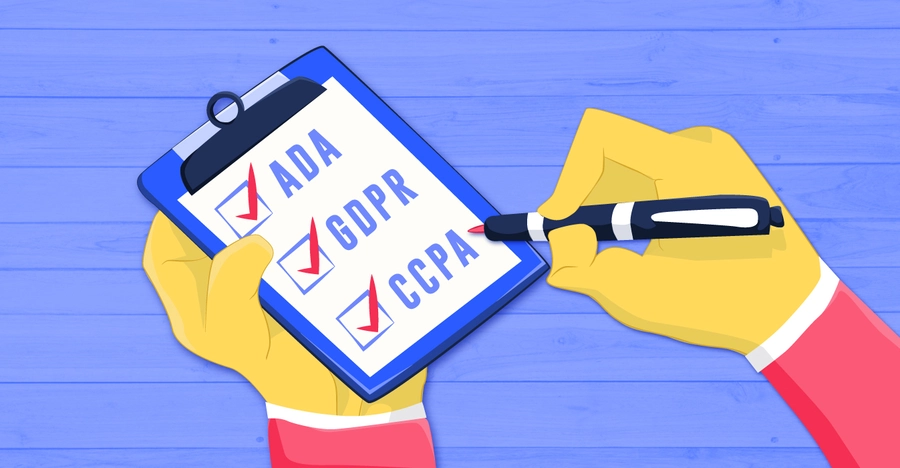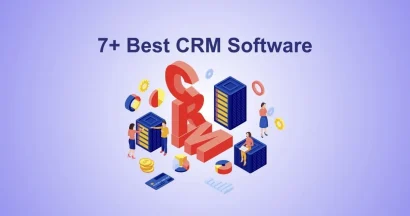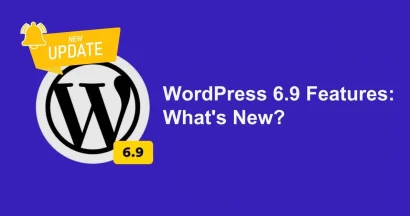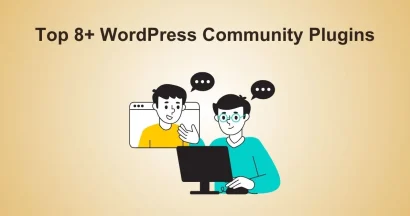Today, WordPress is a real powerhouse in the world of website building. Almost one-third of all existing online sources are made with it. Businesses and individuals alike enjoy the versatility and user-friendly interface of this software.
They use it for various purposes, from creating personal blogs to huge platforms for online sales. However, if you own a WordPress website, you should understand that, apart from selecting beautiful themes or posting captivating content, you also need to make sure it is compliant with relevant legal requirements.
Benefits of WordPress Websites
The popularity of WordPress is well-deserved. Among other content management systems, it offers its users a set of advantages:
Ease of Use
WordPress is incredibly user-friendly, even for those with minimal technical knowledge. You can quickly set up a site and start publishing content. For instance, an independent artist can effortlessly create a gallery-style website to showcase their work and promote it online without incurring significant expenses.
Extensive Customization
With an impressive collection of themes and plugins, WordPress allows you to build a website tailored to your needs. Using only its built-in tools, you can achieve a design that aligns with your commercial and aesthetic goals. For example, an e-commerce store can use the WooCommerce plugin to transform its site into a full-fledged online shop with product listings, a shopping cart, and integrated payment gateways.
SEO-Friendly Features
WordPress websites are designed to rank well on search engines, increasing visibility. A local restaurant, for example, can gain higher rankings in search results, making it easier for potential customers to find them online. This SEO advantage helps businesses attract more traffic and grow their customer base.
Active Community Support
The WordPress community is one of its greatest strengths. With countless forums and online resources, finding help and solutions to any issue is quick and easy. Simply post your question on a WordPress forum, and you’ll likely get answers within minutes.
Scalability and Continuous Innovation
WordPress grows with your business, offering flexibility to expand your site over time. A small business owner can start with a basic website and gradually add features like an online booking system, blog, or customer testimonials as their needs evolve. WordPress also consistently updates its platform to provide cutting-edge tools for more complex projects.
Integrations with Useful Resources
WordPress integrates seamlessly with external tools to enhance user experience. For instance, if your clients require specialized contracts, you can direct them to trusted platforms like Lawrina, which offers professionally drafted legal templates they can download and use easily.
Besides, you can offer your clients additional resources for their comfort. For instance, if they want to buy something that requires a special contract, they can use a reliable legal tech platform — Lawrina — that offers professionally drafted legal templates they can download and apply.
Legal Requirements for WordPress Websites
Whether you use your WordPress website for personal projects or to promote your business, understanding the legal requirements is essential. Here are the key considerations:
Privacy Policy
If your website collects user data — from email addresses to payment information — you must include a privacy policy. This document should explain:
- What information you collect.
- Why you collect it.
- How you use and protect the data.
Terms of Service Agreement
A terms of service agreement outlines the rules for using your site. It typically includes:
- Acceptable use policies.
- Intellectual property rights.
- User responsibilities.
- Disclaimers and limitations of liability.
- Termination clauses.
Disclaimers
Disclaimers are vital for limiting legal liability. They clarify that the information provided on your site is for informational purposes only. This is especially important for websites offering advice in fields such as health, legal, or financial services.
Cookie Consent
If your site uses cookies, you must comply with the General Data Protection Regulation (GDPR) in Europe and the California Consumer Privacy Act (CCPA) in the U.S. This includes:
- Informing visitors about cookie usage.
- Obtaining user consent.
- Providing details on how cookies are used and managed.
Data Security
Any data collected from users, such as contact forms or payment details, must be securely stored and protected from unauthorized access, loss, or misuse.
Copyright Compliance
Ensure all content — including text, images, and videos — does not infringe on others’ copyrights. Use original works or obtain proper permissions for copyrighted material.
Accessibility Standards
Websites must comply with the Americans with Disabilities Act (ADA) to ensure accessibility for people with disabilities.
E-Commerce and Advertising Regulations
For e-commerce sites or those displaying ads, additional rules apply:
- Disclose affiliate relationships.
- Provide accurate product descriptions.
- Honor advertised prices.
- Process refunds in compliance with applicable laws.
Region-Specific Laws
Legal requirements can vary based on your region, industry, and the nature of your website. Always consult a legal professional to ensure full compliance.
By addressing these legal aspects, you can safeguard your website and enhance user trust.
Importance of Legal Requirements for WordPress Websites

Firstly, if your site is legally compliant and follows data privacy regulations and accessibility guidelines, it can shield it from hefty monetary penalties and lawsuits. Laws like GDPR, CCPA, or ADA have strict requirements that websites must adhere to, regardless of the state in which they are registered.
Secondly, it strengthens your site’s reputation. When users see that your online platform respects their privacy rights, is accessible, and is transparent about data usage, their trust in your brand increases.
Thirdly, if your online platform fails to meet any legal requirements, you, as its owner, will have to pay huge fines and even be forced to create a new site.
Tips for Making Your WordPress Website Comply with Law
At first glance, adhering to all legal regulations on your WordPress platform may seem challenging. However, by following these practical steps, you can ensure compliance with legal requirements:
Draft a Transparent Privacy Policy
Clearly explain the types of personal data you collect from visitors, how it will be used, and any third parties involved.
Define Website Usage Rules
Provide a detailed terms of use page outlining visitor rights and responsibilities when interacting with your website.
Declare Cookie Usage and Obtain Consent
Clearly disclose your use of cookies and obtain user consent to comply with GDPR and ePrivacy Regulation requirements.
Secure User Data
Protect collected data by storing it securely and only for the necessary duration. Implement SSL security on your website for an added layer of protection.
Avoid Copyright Infringement
Ensure all content—such as text, images, videos, and music—is either original or properly attributed.
Ensure Accessibility
Make your website accessible to individuals with disabilities in compliance with the Americans with Disabilities Act (ADA).
Include a Disclaimer
Add a disclaimer stating that the content on your site is for informational purposes only and not professional or formal advice.
Comply with Advertising and Marketing Laws
If you sell products or services, follow relevant laws by accurately representing your offerings, practicing honest advertising, and providing clear pricing details.
Adhere to Children’s Online Privacy Laws
If your audience includes children under 13, comply with the Children’s Online Privacy Protection Act (COPPA). Obtain parental consent before collecting personal information from minors.
Stay Updated
Laws and regulations evolve frequently, so review your compliance measures regularly and update them as needed.
Laws change regularly, and your legal statements, privacy policies, or disclaimers should also reflect these changes and be updated accordingly.
Conclusion On Legal Requirements
WordPress is a great software that helps you develop and maintain a dynamic website, but your task is to make it not only nice-looking and informative but also meet the Legal Requirements.
It keeps you away from penalties, builds site visitors’ trust, and paves your path to a more successful platform. While the journey might seem daunting, simple steps can help you meet all the legal requirements concerning website functioning and enjoy your WordPress project flourish.
Read More: The WordPress Plugin for Adding Code Snippets: 7 Top Picks
Contact US | ThimPress:
Website: https://thimpress.com/
Fanpage: https://www.facebook.com/ThimPress
YouTube: https://www.youtube.com/c/ThimPressDesign
Twitter (X): https://twitter.com/thimpress


